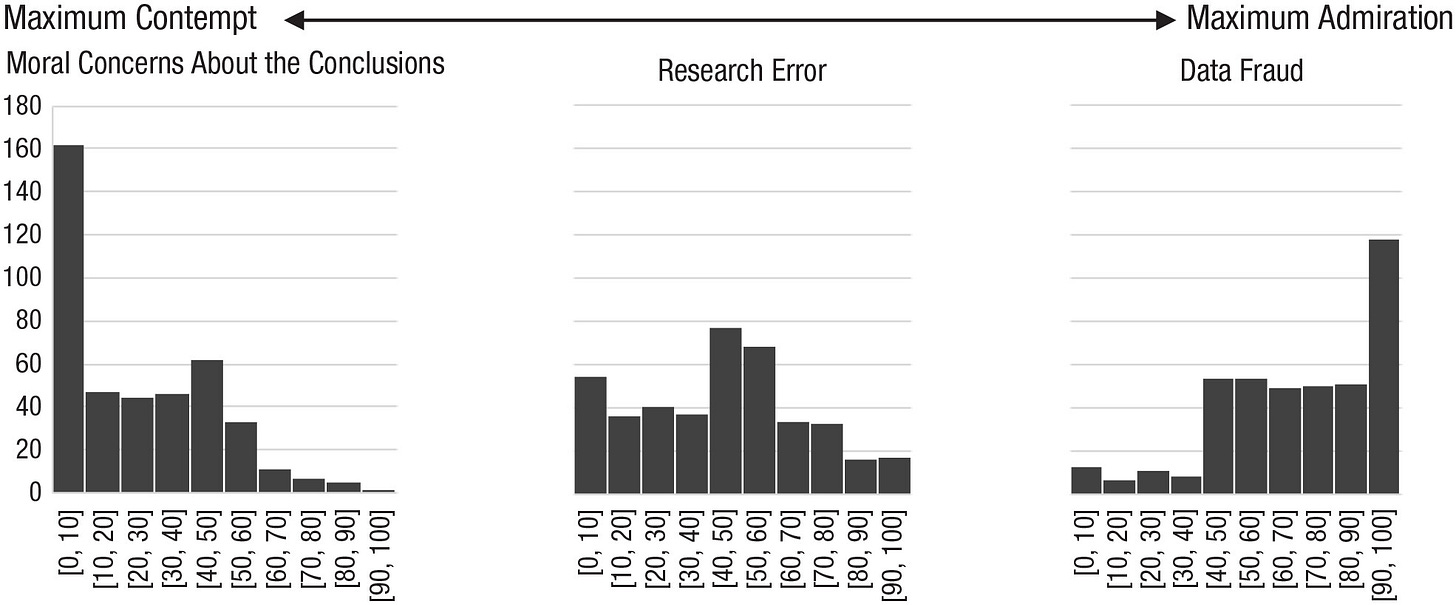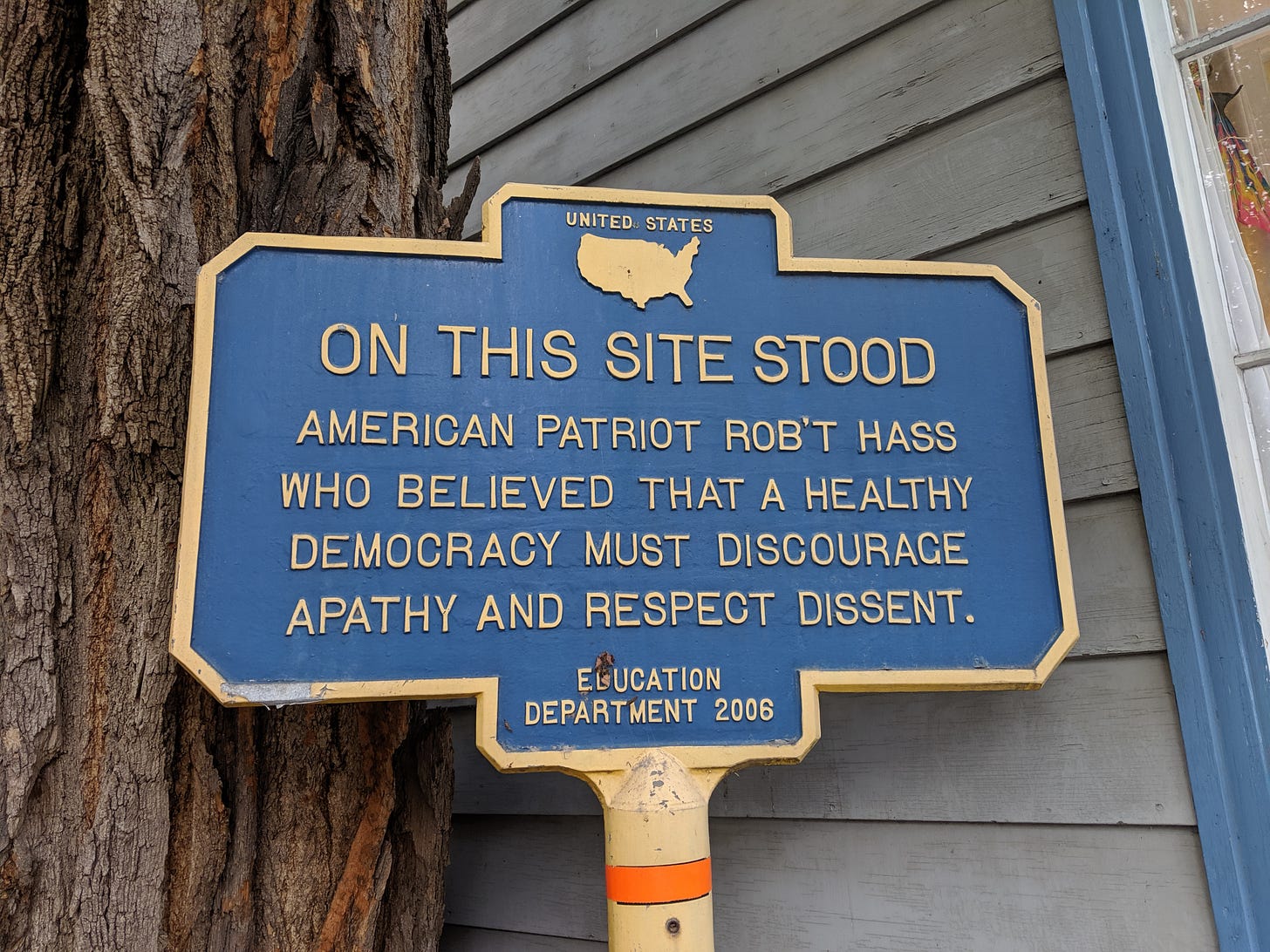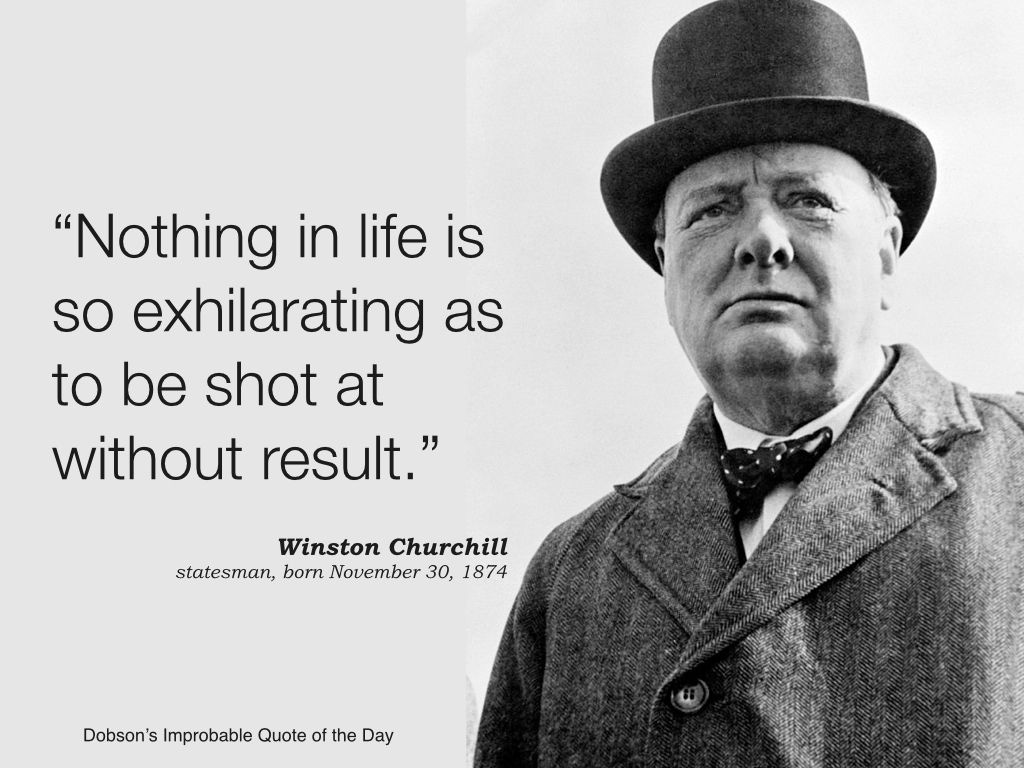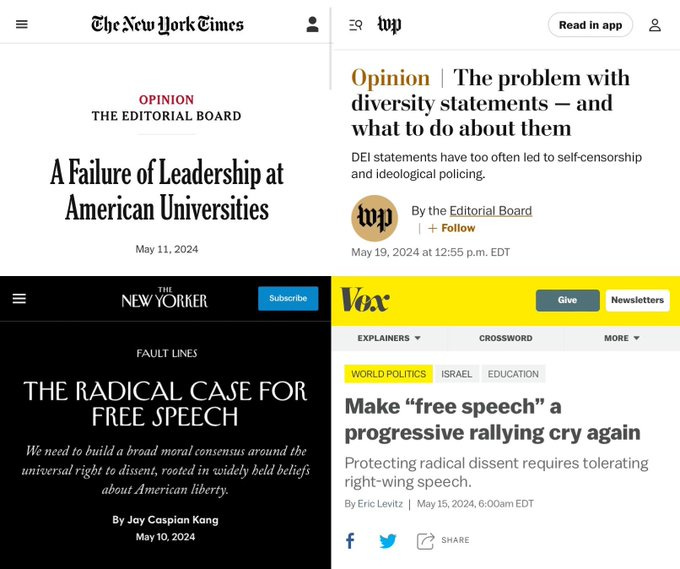My Vita of Denunciation
How My Career Took Off Once I Learned How to Respond to the Contemptible Denouncers
This essay is dedicated to my many denouncers, some of whom are listed here.
The best way to protect the ability to publicly dissent is to publicly dissent. But people are often afraid to do so.
This is especially though not exclusively true in academia because of this:
People, especially academics, often think (erroneously, as I shall show) that if some mob denounces them that their reputation will be ruined and their careers damaged. And surely that is true sometimes, especially if one does not have tenure protections (its not that tenure guarantees job security, it doesn’t; but it does make it harder to be fired for expressing an idea). But oh the rewards that come from facing down mobs.
Think about it. Camille Paglia, Steven Pinker and Jordan Peterson probably hold the all time records for being denounced and not merely surviving but thriving. Hall of Denunciation Fame level stuff. Kathleen Stock, Dorian Abbott, Holly Lawford-Smith, and Michael Bailey are somewhat less well-known than the Hall of Famers, but well-known enough and their careers are thriving post repeat denunciation. Put differently, although there are risks when facing down the mob, the rewards, if handled well, are potentially huge.
Surviving the Mob
Why are the rewards so high? The Denounced will never persuade The Mobsters. But:
Having the courage to stand, alone, against the mob, is a very powerful statement that often gets the attention of everyone else and, therefore, carries with it a certain implicitly powerful ability to persuade. This person is willing to suffer public shaming and ostracism and still they publicly insist?! Even if I don’t agree with everything they say, maybe there is something here worth listening to and, even if not, lord above, I’d love to learn how to stand up to the mob.
The courage to do so, alone, will likely garner respect in many corners other than those already captured by the mobsters.
Surviving The Mob, like almost anything, has elements of skill, opportunity, and luck. I blogged here about 10 Ways to Survive a Cancelation Attack. If you think you may at some point wish to make some controversial point publicly and risk the mob, I highly recommend reading it so you have some strategic ideas before you wade in. Distilling its core ideas to three:
When they come for you, DO NOT ENGAGE THE MOB. Duck and Cover. They are not there for a discussion and they can and will use everything you say as further fodder against you. Mobbings materialize with lightning speed and you can’t fight off hundreds or thousands of people by your lonesome.
Play the long game. Mobbings materialize out of seemingly nowhere (they actually materialize from an authoritarian subculture), BUT they almost always disappear after a few days. The constituents of the mob are bullies and cowards who are all about jumping on the bandwagon when there is a bandwagon to jump on, and they are also unbelievably superficial not serious persons who, once the illusion of gaining social capital by denouncing you disappears, they just move on to the next thing.
Document everything. Then, if the spirit moves you, plot your revenge. The world hates these mobs, and even most academics hate them, even those who remain silent. This was recently demonstrated in this paper. The key result is shown below.
Y-Axis = number of academics.
X-Axis = score on the Contempt (low end) to Admiration (high end) scale.
Left panel: calls to retract a paper for moral “violations.” Middle panel: Calls to retract for research (i.e., data) errors. Right panel: Calls to retract for fraud.
As you can see:
The vast majority of academics hold those who engage in calls (usually by social media or open letters, i.e., self-appointed morality police mobs) to retract papers for supposed moral transgressions (typically, racism, transphobia, sexism, etc.) in maximal contempt.
Hardly any admire the mobsters. Now, there are millions of academics around the world, so if 1/10,000 join the mob, they can still garner hundreds or even thousands of social media posts or signatories to online petitions denouncing some person or paper. Don’t be fooled by this — most think it is contemptible behavior.
Let’s talk about “the right side of history” — a rhetorical move often used by authoritarians to impose their will. But, historically, when has authoritarianism been “on the right side of history”? It is always the dissenters from authoritarian systems, whether Martin Luther or Martin Luther King, whether Nelson Mandela or James Madison, whether George Orwell or George Washington, who are recognized as being “on the right side of history” (whatever other flaws they may have had).
Here is my list of denunciations to date:
I called “White women white womening” (wwww) a “racist sneer” on Twitter. People started contacted my deans because I was “harrassing” and “bullying” Abeba Birhane, who tweeted it. A partial overview of this can be found here (I hope to do an essay with more details here down the road). Note: “White women white womening” is a racist sneer.
Although this was not personal, a conference I was invited to, The National Association of Scholars conference, Fixing Science, was so widely denounced that two untenured invitees dropped out. The National Association of Scholars is the probably the last conservative-leaning professional association in academia. It was denounced for being a “front of the KKK” (that is a literal quote). And it was denounced by a very influential science reformer who concoocted a conspiracy theory involving delusions of climate denialism that would supposedly take place (it didn’t).
Kim Chaney, then a just-minted Rutgers Social Psychology PhD, now an assistant professor at UConn, denounced me in an internal email for making a “racist” statement to the Department about the then-ongoing social justice/George Floyd protests, in part, for referring to the mostly peaceful rioters and looters who captured central Seattle, caused billions in damage, and set the stage for dozens of murders as “thugs” but also because I called for academics to be their best selves, engaging in calm, reasoned discourse about controversial issues. I kept the email (point 2, document everything!), which included delicious nuggets such as these:
“To ask the BIPOC faculty, staff, and students of color to remain “sober” and “cool headed” demonstrates a failed understanding of the systemic and systematic ways in which this country has failed its very citizens and enacted violence against Black Americans- and the true exhaustion of constantly having to defend their right to exist freely and wholly.”
“I’m appalled at your reference to “thugs” and your continued, incessant focus on looting.”
After all: 1. Why engage in reasoned discourse, when one can react like a narcissistic emotional child in an adult’s body with an elite vocabulary? and 2. Let’s put aside that Seattle and Portland, where some of the worst rioting and violence took place, are two of the Whitest cities in the country. Everyone knows that the only possible use of “thugs” is as a racist dogwhistle. Right?
Kim is also a repeat denouncer, being one of the signatories to the authoritarian open letter on the Fiedler on the Roof/Racist Mule fiasco. The table below, which is in press in a chapter on academics censoring academics, compares the actions advocated in an open letter signed by almost 1400 academics denouncing Fiedler and the papers he accepted (including one of mine) to practices common under 20th century authoritarian systems. Left, the authoritarian principle. Middle, the authoritarian practice. Right, quotes from the open letter.

Fiedler on the Roof/Racist Mule denunciation.
Shortly after taking the chair in Anthropology, I was again denounced by one of the department members in an internal email for this Twitter thread. The thread points out, correctly, that, although most claims about human races are biologically meaningless, race is indeed a scientific construct that is routinely used in evolution and scientific studies of other species, and those claiming that “race is not a scientific construct” (a very different claim than “there is no biological basis for claiming humans are divided into races”) are ax-grinding propagandists.
Because people fear the mob, the best way to model fighting the mob is to demonstrate success following such mobbings. By playing the long game, one can have extraordinary success by fighting the mobsters. In that spirit, I present my vita of denunciation: The publications, grants, reports, mass media coverage, influence on Congress (and more) I have had post-mobbings, but, especially, because of those mobbings. That is, without the denunciations and mobbings, I probably would never have done most of this.
The best way to protect the ability to publicly dissent is to publicly dissent
Once I learned to follow my own advice, fighting the mob became: 1. Very satisfying; 2. Rocket boosters for my academic career.
Accomplishments that were inspired by or direct results of the various mobbings are flagged in bold italics.
My Vita of Denunciation
PROFESSIONAL POSITIONS:
2018 Promoted to Distinguished Professor, Department of Psychology, Rutgers University
2018-2022 Chair, Department of Psychology, Rutgers University
2023-2024 Acting Chair, Anthropology, Rutgers
Note: As described here, my deans saw fit to appoint me as Acting Chair of Anthropology (after an internal snafu there) in part because they knew I had a tough skin and could handle being denounced (having someone from another department named chair is also a difficult position — and, sure enough, I was denounced early in my term. But I survived that well enough and think I eventually earned the grudging respect of most of the faculty).
More important, as explained here, the RU Admin doubled my salary. Thank you, mobsters!
ACADEMIC HONOR
2024 Named to The American Academy of Science and Letters (a newish alternative to as The National Academies of Science and The American Academy for the Advacement of Science). Like NAS and AAAS, AASL membership is an honorary acknowledgment of academic accomplishment. Unlike NAS and AAAS, AASL also emphasizes intellectual courage and advancing open inquiry.
EXTERNAL GRANTS & CONTRACTS
2024 Institute for Humane Studies. Co-PI (Anna Krylov, PI). $15,000 for USC conference on scientific censorship.
2023-2024 Institute for Humane Studies. $5,000. Co-PI (Cory Clark, PI) Conference Grant for Society for Open Inquiry in the Behavioral Sciences.
2023-2024 Foundation for Individual Rights and Expression. $4,000. Conference grant. Co-PI (Cory Clark, UPenn, PI).
2023 Network Contagion Research Institute. Contract, $15,000. Analysis of self-harm websites produced by major search engines.
2023 Foundation for Individual Rights and Expression. $3,500. Conference grant. Co-PI (Cory Clark, UPenn, PI).
2022-2023 Foundation for Individual Rights and Expression. $6,500. Grant to support costs associated with founding the new scholarly journal, Journal of Open Inquiry in the Behavioral Sciences.
2022 Institute for Humane Studies, Sabbatical Award, $15,000. This supported, among other things, work on The New Book Burners, about academics censoring academics.
2022 Institute for Humane Studies, Travel Award, $1,500. This supported, among other things, work on The New Book Burners, about academics censoring academics.
UNDER REVIEW, UNDER REVISION, IN PROGRESS
Bork, N., Jussim, L., Finkelstein, D., Sudhakar, P. & Finkelstein, J. A theory of reciprocal radicalization.
Jussim, L. & Honeycutt, N. Bias in psychology: A critical, historical, and empirical review.
Jussim, L., Honeycutt, N., Finkelstein, D., Yanovsky, S. & Finkelstein, J. Academic misinformation. Chapter in preparation for The Psychology of False Beliefs, (J. Forgas, editor), The Visegrad International Symposium on Social Psychology.
Rubinstein, R., & Jussim, L. The effects of associative and propositional target information on implicit and explicit impression formation and stereotype bias.
Bass, M., Reid Ross, A., Wolfson, B., Finkelstein, J., Yanovsky, S., Finkelstein, D., Stevens, S. T., Honeycutt, N., Paresky, P., Feinberg, A., Small C. A. & Jussim, Lee Foreign funding of U.S. higher education predicts campus erosion of democratic speech norms and antisemitism. Submitted for a special issue of Frontiers in Social Psychology special issue on Threats to Democracy.
BOOKS
In press. Maranto, R., Salmon, C., Jussim, L., & Satel, S. (Editors). The free inquiry papers. American Enterprise Institute Publishing.
In press. Eppard, L., Mackey, J. & Jussim, L. (Editors). The poisoning of the American mind. George Mason University Press.
2022. Jussim, L., Stevens, S. T., & Krosnick, J. A. (Editors). Research integrity: Best practices in the behavioral sciences. (Oxford University Press).
ARTICLES AND CHAPTERS
In press. Jussim, L. & Honeycutt, N. Weaponizing the bureaucracy. To appear in Bad faculty (N. Wolfinger, Editor). Sydney Australia: Quillette Press.
In press. Jussim, L., Yanovsky, S., Careem, A., Honeycutt, N. & Finkelstein, D. Limitations, contestations, failures and falsification of dramatic claims in intergroup relations. To appear in T. Nelson (editor), The handbook of stereotypes, prejudice, and discrimination (4th edition). Routledge.
In press. Jussim, L., Honeycutt, N., Careem, A., Bork, N., Finkelstein, D., Yanovsky, S., Finkelstein, J. The new book burners: Academic tribalism. To appear in The Tribal Mind: The Psychology of Collectivism, Visegrad International Symposium on Social Psychology, J. Forgas, Ed. New York: Taylor and Francis.
In press. Jussim, L., Careem, A., Goldberg, Z., Honeycutt, N., & Stevens. S. T. IAT scores, racial gaps, and scientific gaps. In Krosnick, J.A., Stark, T. H & Scott, A.L. (Eds.). The future of research on implicit bias. New York: Cambridge University Press.
In press. Careem, A. & Jussim, L. Why social justice needs free inquiry. Chapter to appear in The Free Inquiry Papers (R. Maranto, C. Salmon, L. Jussim, & S. Satel, editors). American Enterprise Institute Publishing.
In press. Salmon, C. & Jussim, L. Lysenkoism then and now: A cautionary tale of censorious social norms. Chapter to appear in The Free Inquiry Papers (R. Maranto, C. Salmon, L. Jussim, & S. Satel, editors). American Enterprise Institute Publishing.
In press. Maranto, R., Salmon, C., Jussim, L., & Satel, S. Why the Free Inquiry Papes? Why now? Chapter to appear in The Free Inquiry Papers (R. Maranto, C. Salmon, L. Jussim, & S. Satel, editors). American Enterprise Institute Publishing.
In press. Maranto, R., Jussim, L., Salmon, C. & Satel, S. Conclusion: How to bring back free inquiry. Chapter to appear in The Free Inquiry Papers (R. Maranto, C. Salmon, L. Jussim, & S. Satel, editors). American Enterprise Institute Publishing.
2024. Diversity is diverse: Social justice reparations and science. Perspectives on Psychological Science, 19,564-575.
2024. Clark, C. J., al-Gharbi, M., …, Jussim, L., …, von Hippel, W. Reply to Darlow and Gray: Censorship is exclusion. Proceedings of the National Academy of Sciences, 121, e2321261121
2023. Clark, C., Jussim, L., … von Hippel, W. Prosocial motives underlie scientific censorship by scientists: A perspective and research agenda. Proceedings of the National Academy of Sciences, 120 (48), e2301642120.
2023. Rubinstein, R. S., Marshall, M., Jussim, L., & Honeycutt, N. Effects of individuating information on implicit person perception are largely consistent across individual differences and two types of target groups. Current Research in Behavioral Sciences, 4, 100090.
2023. Jussim, L., & Honeycutt, N. (2023). Psychology as science and as propaganda. Psychology Learning & Teaching, 14757257231195347.
2023. Corneille, O., …, Jussim, L., …, Lotter, L.D. Beware “persuasive communication devices” when writing and reading scientific articles. eLife 12:e88654.. (14 authors, I am 7th).
2023. Jussim, L., Honeycutt, N., Paresky. P., Careem, A., Finkelstein, D. & Finkelstein, J. The radicalization of the American academy (pp. 343-366). In, Zúquete, J.P. (ed). The Palgrave Handbook of Left-Wing Extremism, Volume 2. New York: Palgrave MacMillan.
2023. Honeycutt, N. & Jussim, L. Political bias in the social sciences: A critical, theoretical, and empirical review (pp. 97-146). In Frisby, C.L., Redding, R.E., O'Donohue, W.T., & Lilienfeld, S.O. (Eds.), Ideological and political bias in psychology: Nature, scope and solutions. New York: Springer.
2023. Abbot, D.,…Jussim, L.,… West, J.D. In defense of merit in science. Journal of Controversial Ideas, 3(1), 1, doi:10.35995/jci03010001.. 1paper has 29 authors, listed alphabetically. Covered in the Wall Street Journal, The “Hurtful” Idea of Scientific Merit. and the New York Times, A Paper that Says Science Should be Impartial was Rejected by Major Journals. You Can’t Make This Up.
2022. Rubinstein, R. S., Jussim, L., Loh, B. & Buraus, M. A theory of reliance on individuating information and stereotypes in implicit judgments of individuals and social groups. Journal of Theoretical Social Psychology. https://doi.org/10.1155/2022/5118325
2022. Suh, A., Krosnick, J. A., Jussim, L., Stevens, S. T. & Anglin, S. Science reform (pp. 1-35). In Jussim, L., Stevens, S. T., & Krosnick, J. A. (Editors). Research integrity: Best practices in the behavioral sciences. (New York: Oxford University Press).
2022. Jussim, L., Stevens, S. T. & Anglin, S. Questionable interpretive practices (pp. 224-259). Jussim, L., Stevens, S. T., & Krosnick, J. A. (Editors). Research integrity: Best practices in the behavioral sciences. (New York: Oxford University Press).
2022. Cantu, E., & Jussim, L. Microaggressions, questionable science, and free speech. Texas Review of Law and Politics, 26, 217-267.
2022. Clark, C. J., Honeycutt, N., & Jussim, L. Replicability and the psychology of science. In Avoiding Questionable Research Practices in Applied Psychology (pp. 45-71). W.T. O’Donohue, A. Masuda & S. O. Lilienfeld (Eds.). Cham: Springer International Publishing.
2022. Fox, N., Honeycutt, N., & Jussim, L. (2022). Better understanding the population size and stigmatization of psychologists using questionable research practices. Meta-Psychology, 6.
2021. Rubinstein, R. S., Jussim, L., Bock, J. E., & Loh, B. Unobservable stereotypes are more malleable than observable stereotypes in implicit person perception. Journal of Theoretical Social Psychology, 5, 318-337.
2021. Jussim, L., Stevens, S. T., & Honeycutt, N. The accuracy of stereotypes of personality (pp. 245-260). In T. D. Letzring & J. S. Spain (Eds.), The handbook of accurate personality judgment: Theory and empirical findings.
2020. Stevens, S. T., Jussim, L., &, Honeycutt, N. Scholarship suppression: Theoretical perspectives and emerging trends. Societies, 10(4), 82; https://doi.org/10.3390/soc10040082
2020. Peters, U., Honeycutt, N., De Block, A., & Jussim, L. (2020). Ideological diversity, hostility, and discrimination in philosophy. Philosophical Psychology, 33, 511-548.
2020. Honeycutt, N, & Jussim, L. A model of political bias in social science research. Psychological Inquiry, 31, 73-85.
2020. Jussim, L., Stevens, S. T., Careem, A., & Honeycutt, N. How much do IAT scores explain racial gaps? In J. Forgas, K. Fiedler, & R. Baumeister, Applied Social Psychology, The Sydney Symposium on Social Psychology, pp. 312-333. New York: Routledge.
2019. Careem, A., Jussim, L, & Rubinstein, R. Stereotypes. Oxford Bibliographies Online. (this is an update of our 2012 entry and includes some of the same material).
2019. Rubinstein, R. & Jussim, L. Stimulus pairing and statement target information have equal effects on stereotype-relevant evaluations of individuals. Journal of Theoretical Social Psychology, 3, 231-249.
2019. Jussim, L., Krosnick, J. A., Stevens, S. T., & Anglin. S. M. A social psychological model of scientific practices: Explaining research practices and outlining the potential for successful reforms. Psychologica Belgica, 59, 353-372. (special issue on science reform).
2019. Stevens, S. T., Jussim, L., Anglin, S. M., & Honeycutt, N. Direct and direct influences on perceptions of scientific findings. In B. T. Rutjens and M. J. Brandt (Eds), Belief systems and the perception of reality, pp. 117-133. New York: Routledge.
2019. Jussim, L., Stevens, S. T., Honeycutt, N., Anglin, S. M., & Fox, N. Scientific gullibility. In J. Forgas & R. Baumeister (Eds.), The social psychology of gullibility: Fake news, conspiracy theories and irrational beliefs (The Sydney Symposium on Social Psychology), pp. 279-303. New York: Routledge.
2019. Jussim, L., Stevens, S. T., Honeycutt, N. Accuracy of demographic stereotypes. Journal of South China Normal University 3, 5-18.
2019. Jussim, L., Stevens, S. T., & Honeycutt, N. Unasked questions about stereotype accuracy. Archives of Scientific Psychology, 6, 214-229.
CONFERENCES AND SYMPOSIA ORGANIZED
Clark, C., Jussim, L., Salmon, C. The Conference of the Society for Open Inquiry in the Behavioral Sciences, To be held February 2024, San Diego, Ca.
Clark, C. & Jussim, L. The Conference of the Society for Open Inquiry in the Behavioral Sciences, February 2023, Atlanta, Ga.
Jussim, L., Tabarovsky, I., & Richmond, J. American authoritarianism. Held electronically, Nov 10, 2021.
SYMPOSIA, CONFERENCE PAPERS, AND PRESENTATIONS
Jussim, L. Big bad bags of bias. Presented at the November, 2023 Festschrift for Joachim Krueger, Monte Verita, Switzerland
Jussim, L. The New Book Burners. Presented at the July 2023 Sydney Symposium on Social Psychology, Applied Social Psychology, Visegrad, Hungary.
Jussim, L. Academic misinformation. Presented the conference on Misinformation held by The Institute for Humane Studies, August, 2023, Washington, DC.
Jussim, L. The radicalization of the academy. Presented at the Stanford Conference on Academic Freedom, November, 2022.
Jussim, L., Finkelstein, D., & Honeycutt, N. How the blinding uncertainty of political extremism erodes social science credibility. Presented at the July 2022 Visegrad International Conference on Social Psychology.
Jussim, L. The radicalization of the academy. Presented at the Institute for Humane Research, June, 2022.
Jussim, L. Psychological science going bad and how to improve it. Psi Chi Distinguished Speaker, Association for Psychological Science. May 2022.
Jussim, L. Implicit bias: Racial gaps and scientific gaps. Merton Lecture Series, organized by physicists at Princeton and Rutgers, given remotely (via Zoom, November 11, 2020).
Jussim, L. Intellectual diversity is crucial for strong (social) science. Presented at the February 2020 Political Psychology pre-conference of the Society for Personality and Social Psychology, New Orleans.
Jussim, L. Groupthink in academia. Presented at the February 2020 conference of The National Association of Scholars, Oakland, Ca.
Jussim, L. Intellectual diversity, free speech and academic freedom confront the authoritarian left. Presented 4/9/21 at LeFrak Forum’s 31st Annual Program: Freedom of Speech and Intellectual Diversity on Campus.
Jussim, L. Do IAT scores explain racial gaps? Presented at the June 2019 Sydney Symposium on Social Psychology, Applied Social Psychology, Visegrad, Hungary.
Jussim, L. Theoretical and statistical misinterpretations of IAT scores. Presented at the June 2019 Conference on Scientific Error and Statistics, LMU, Munich, Germany.
Reyna, C. & Jussim, L. How to limit political bias in social science research. Presented at the June 2019 meeting of Heterodox Academy, New York, NY.
Jussim, L. How political bias in universities purges heterodox thinkers, corrupts scholarship, and creates an environment of fear. Conference of the Association of Private Enterprise Education, Las Vegas, NV, April 2-4, 2018.
TEACHING
Radicalization and protest (Graduate). I created this course on the fly, during the Summer of 2020. First taught it in Fall 2020. I first met Dorian Abbot in it, who appeared as a guest during his first denunciation, by graduate students at UChicago for … ready? … wait for it … criticizing DEI.
UNDERGRADUATE HONORS THESIS
Brett Byll, 2021. His thesis was on predictors of support for violent protest. He found strong correlations between leftwing authoritarianism and support for the violent social justice protests of 2020 and between rightwing authoritarianism and support for armed anti-Covid lockdown protests. You can find a short version here at Free Black Thought. Brett received the Henry Rutgers Award for his thesis, which is the highest honor Rutgers gives to honors students.
PROFESSIONAL SOCIETY FOUNDER/FOUNDING MEMBER
Society for Open Inquiry in the Behavioral Sciences
Academic Freedom Alliance
EDITORIAL POSITIONS
Founder, Inaugural Editor-in-Chief, Journal of Open Inquiry in the Behavioral Sciences
PUBLIC REPORTS
2023. Princeton principles for a campus culture of free inquiry. Brooks, S.,…, Jussim, L.,…,Whittington, K. 15 authors listed alphabetically. https://jmp.princeton.edu/princeton-principles-campus-culture-free-inquiry
The corruption of the American mind: How concealed foreign funding of U.S. higher education predicts erosion of democratic values and antisemitic incidents on campus. (2023). Small, C. A., Reid-Ross, A., Kolberner, W., Patterson, D., …, Jussim, L. Network Contagion Research Institute Report. This report reached the U.S. House of Representatives Committee on Education and the Workforce, which held an emergency session, and, with bipartisan support, advanced a bill for consideration by the full House to address the corruption uncovered in this report. https://edworkforce.house.gov/news/documentsingle.aspx?DocumentID=409719#. It was also covered in The Free Press, Is Campus Rage Fueled by Middle Eastern Money?
Anti-Zionism, antisemitism, and the polarization pendulum. (2023). Jussim, L., Reid Ross, A., Goldenberg, A., Finkelstein, J., Suddhakar, P., Ramos, C. & Glover, T. Network Contagion Research Institute report.
Memes, missiles and mobilizations: An analysis of the 2021 Israel/Hamas conflict. Network Contagion Research Institute report.
Quantitative methods for investigating anti-Hindu disinformation. (2022). Sudhakar, P., Farmer, J., Finkelstein, J., Jussim, L., Riggleman, D. Network Contagion Research Institute report.
Online communities of adolescents and young adults celebrating, glorifying, and encouraging self-harm and suicide growing rapidly on Twitter. (2022). Goldenberg, A., Farmer, J., Jussim, L., Sutton, L., Finkelstein, D., Ramos, C., Paresky, P. & Finkelstein, J. Network Contagion Research Institute report. This was covered in the Washington Post, Self-Harm Posts Surging on Twitter.
Antisemitic disinformation: A study of the online dissemination of anti-Jewish conspiracy theories. (2020). Finkelstein, J., Paresky, P., Goldenberg, A., Zannettou, S., Jussim, L., Baumgartner, J., Riggelman, D., Farmer, J., Goldenberg, P., Donohue, J., & Modi, M. H. Network Contagion Research Institute report.
Network-enabled anarchy: How militant anarcho-socialist networks use social media to instigate widespread violence against political opponents and law enforcement. (2020). Finkelstein, J., Goldenberg, A., Stevens, S., Jussim, L., Farmer, J., Donohue, J. K., & Paresky, P. Network Contagion Research Institute report. Covered in the New York Times, Whose American Is It?, and the Washington Post twice (Ambush Shooting of Two Sheriffs, Violent Memes and Message Surging on Far Left Social Media)
Conclusion
The best way to protect the ability to publicly dissent is to publicly dissent. To beat the mobsters, play the long game. And play it on your turf, not theirs.
Epilogue
The left rediscovers free speech:
Some quotes:1
NYT: “It has not gone unnoticed…that many of those who are now demanding the right to protest have previously sought to curtail the speech of those whom they declared hateful…Establishing a culture of openness and free expression is crucial to the mission of educational institutions.”
WAPO: “The very purpose of the university is to encourage a free exchange of ideas, seek the truth wherever it may lead, and to elevate intellectual curiosity and openness among both faculty and students. Whatever their original intent, the use of DEI statements has too often resulted in self-censorship and ideological policing.”
NEW YORKER: “These principles also entail disengaging from the construction of safe spaces, the forbidding of certain words, and the prosecution of hate speech—practices that have offered little in the way of real protection but provided a good deal of reactionary fodder. This means that free-speech radicals need to reject the premise that a certain set of words should be set aside as ‘hate’ and prosecuted as crimes. Words are not violence.”
VOX: “There is reason to believe that progressives would be better equipped to resist the present crackdown on pro-Palestinian advocacy had social justice activists not previously popularized an expansive conception of harmful speech.”
Image and curation of quotes courtesy of Steve McGuire on X.














re: "Play the long game [...] they just move on to the next thing.
Up until 3 Days ago, I would have agreed 100% with this. And I still think that playing the long game is correct. But 3 days ago I read this:
https://www.thefp.com/p/nellie-bowles-morning-after-the-revolution
in particular:
"To do a cancellation is a very warm, social thing. It has the energy of a potluck. Everyone brings what they can, and everyone is impressed by the creativity of their friends. It’s a positive thing, what you’re doing, and it doesn’t feel like battle, but like tending the warm fire of community. You have real power when you’re doing it, and with enough people, you can oust someone very powerful. "
And before I read that, I always thought the great problem of cancellation and peer pressure was one of cowardice. If we could just get people to demonstrate a bit more spine -- and help those trying to oppose cancellations -- it would just stop. Now I have serious doubts about this approach. Being loved by Bari Weiss and converting to Judaism seems to have redeemed Nellie Bowles' soul. What if 'peer pressure' is not the pressure to conform, against your will, against your own knowledge, in order to belong but instead some sort of horrible perversion of the desire to grow, be nurtured, and succeed?
Minor point, but do you mean Kathleen Stock rather than “Helen Stock”?